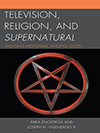- Author(s): Rhonda Burnette-Bletsch
- When: 2019-09
- Where: Scorsese and Religion (Studies in Religion and the Arts, Volume: 15)
The Last Temptation of Christ (1988) is one of the most controversial films in the history of cinema. Martin Scorsese’s long struggle to see this picture realized and the vehement reactions his decidedly human depiction of Jesus inspired are well documented. Many theologians and theologically sensitive film critics have castigated the film for what they deem its heretical Christology. Lloyd Baugh, for example, accuses Scorsese of going far beyond his source material to diminish the character of Jesus and to suggest “a profound and unbridgeable gap between his humanity and his being the Son of God.” Steven Greydanus charges the filmmaker with producing a portrait of Christ that “is utterly antithetical to Christian belief and sentiment,” a representation not merely emphasizing Jesus’ humanity but “effectively contradicting his divinity.”
Nevertheless, a few commentators have defended Scorsese’s theological vision. According to Christopher Deacy, “The Last Temptation does not deny Christ’s divinity, but, in contradistinction to the traditional Christ epic, it stresses the unity between the divine and human natures such that, as an example and pioneer, Christ can fulfill the function of redeemer through already having undergone what it means to be fully human.” Graham Holderness also applauds Scorsese, maintaining that in Last Temptation “flesh and spirit can find a possible, though never easy or painless, reconciliation. This truly is, as far as the world of art is concerned, incarnation or the Word become flesh.”
These diametrically opposed evaluations of Scorsese’s Christology raise questions concerning how any filmmaker (or artist or novelist, for that matter) might portray Jesus as both God and man. Might this be too much to ask of an audiovisual medium with an average two-hour run time when theologians have grappled for centuries to adequately articulate what Kierkegaard famously called “the absolute paradox” of the incarnation? Christian doctrine affirms the hypostatic union of two natures (divine and human) in the one person of Jesus, who is of one substance with the Father. Moreover, the Council of Chalcedon proclaimed “the Christ in his humanity is like us in all things except sin.”6 One wonders whether this kind of Jesus can make a plausible, or even very interesting, film character.









